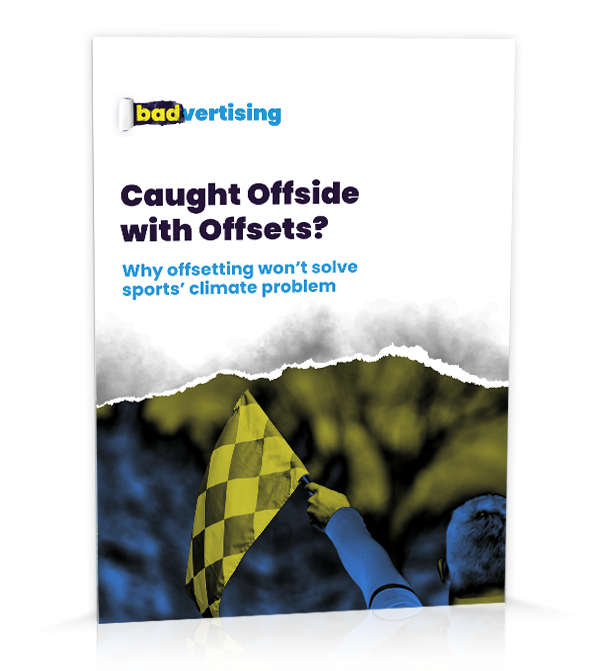Briefing: Why offsets won’t solve sports’ climate problem
With the World Cup entering its final stages, and the atmosphere reaching fever pitch, sports’ ability to connect, engage, and inspire billions of people around the globe is clear to see. But despite this unique ability, sport is yet to get serious about tackling climate change.
This is acutely true regarding elite sports’ attempt to eliminate its vast environmental footprint through offsetting schemes and projects. While the FIFA World Cup in Qatar made headlines with its dubious offsetting methods and carbon-neutral claims, the use of the mechanism is widespread and dominant within sport and beyond it. The problem, however, is that it doesn’t work, causing real harm to communities and the natural world, all while restricting the way in which organisations think and approach sustainability.
A new briefing from Badvertising, titled Caught offside with Offsets? Why offsetting won’t solve sports’ climate problem, sets out the main issues with relying on offsetting to achieve emissions reductions and other sustainability goals, arguing that:
Offsetting doesn’t work - in its current form scientific evidence suggests that offsetting doesn’t deliver on its promises.
It can cause real harm - both in terms of direct failure, but also in terms of the impact of offsetting projects on local communities, economies, and the natural world.
It is a form of carbon laundering - attempting to offset stable stores of fossil carbon with unstable stores like trees, which face multiple threats in our warming world, may mask the true climate impact.
The system can be gamed - through accounting tricks and murky carbon markets, offsets can be misallocated on a mass scale, which often means there is no reduction in overall emissions.
It provides an excuse to continue polluting - Offsetting can justify and legitimise the status quo, allowing organisations to continue polluting while claiming leadership and progress on sustainable and environmental issues.
It inhibits real change - the cost and convenience of offsetting means that the more challenging structural decisions required to address sport’s climate impact may be delayed. As an approach, offsetting may restrict our thinking and ambition around how sport can drive climate solutions and as part of a thriving planet.
This briefing marks the first part of a new inquiry with the Cool Down sport and climate network, which will explore practical alternatives to offsetting within sport, focusing on key emissions hotspots such as travel, waste, textiles, energy and nutrition. The aim is to gather creative ideas and best practice from across the sporting world, ranging from the structural changes to individual actions, to help cut emissions at their source, thereby removing the need for offsetting in the first place.
If you’d like to get involved in this project, take part in the workshops and keep abreast of developments, please email cooldown@newweather.org.

